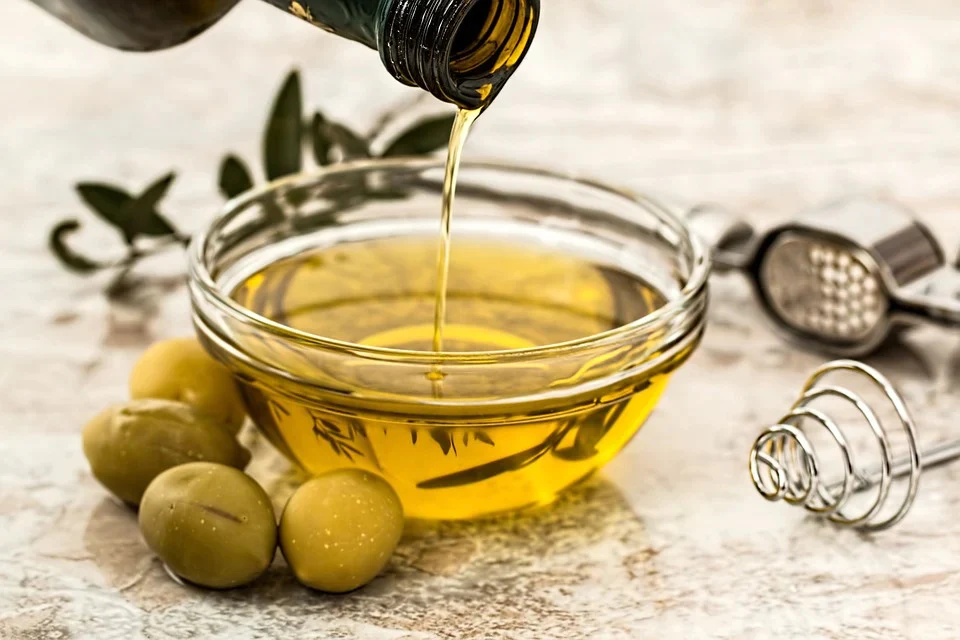Olive oil is a popular choice for health-conscious people looking to improve their diet. It provides many important nutrients, including monounsaturate fats (MUFAs) and polyphenols.
Research has shown that MUFAs can help lower cholesterol, raise HDL levels and decrease triglycerides. It also helps lower inflammation and oxidative stress that contribute to cardiovascular disease.
1. It helps in reducing the risk of heart diseases
The monounsaturate fatty acids and polyphenols present in olive oil can help lower cholesterol levels, which are believe to be the root cause of heart disease. It also helps improve blood pressure and prevent plaque formation in the arteries.
Replacing butter, mayonnaise and other saturate fats with olive oil has been shown to be beneficial for people who are at risk of cardiovascular disease.
In a new study publish in the Journal of the American College of Cardiology, researchers found that replacing about 10 grams of fat from margarine, butter or mayonnaise with olive oil every day was associate with a lower risk of death from cardiovascular disease, cancer and neurodegenerative diseases like Alzheimer’s.
The study is an important step toward better understanding the role of dietary fat in cardiovascular disease. However, it will take further research to fully understand how to best use olive oil and other dietary fats to reduce cardiovascular disease, according to Marta Guasch-Ferre, an assistant professor at Harvard University’s School of Public Health.
2. It helps in reducing the risk of strokes
Olive oil is a healthy source of monounsaturate fat that can help lower your risk of stroke. It contains natural phenolic compounds that are powerful anti-inflammatory and antioxidants.
It has also been shown to have a positive effect on blood clots in the body. Eating olive oil on a regular basis has been found to reduce the level of platelet activation, which means it can prevent blood clots and thus lower your risk of heart attack or stroke.
In a study that look at 7,625 people age 65 and over, those who use a lot of olive oil had a 41% lower risk of stroke than those who didn’t use any. But other factors, such as diet, exercise and body mass index, play a role in reducing the risk of stroke.
3. It helps in reducing the risk of cancer
Olive oil has an abundance of antioxidants, mainly monounsaturate fatty acids (oleic acid), squalene and various phenolic compounds (simple phenols, secoiridoids, and lignans).
The strong anti-oxidant properties of olive oil limit cellular oxidative stress, DNA damage and the initiation of tumors. These effects may be link to oleic acid, which acts on cancer-causing genetic mutations, studies have shown.
Oleocanthal, the molecule that causes the ‘peppery’ sensation in the back of your throat when you take extra virgin olive oil, zaps cancer cells by rupturing their membranes and releasing enzymes. This happens in cancer cells without harming healthy ones.
4. It helps in reducing the risk of diabetes
When you add extra virgin olive oil to your meals, it helps to slow down the absorption of carbohydrates and sugar into your bloodstream. This can help control your blood sugar levels and prevent diabetes complications.
Extra virgin olive oil is rich in monounsaturate fats and polyunsaturate fats (PUFAs), which are good for your heart health. It also contains antioxidants that may help reduce the risk of diabetes and other chronic diseases.
A study has shown that consuming extra virgin olive oil daily can significantly improve HbA1c, which is an indicator of your average blood sugar over two to three months. This is an important finding for people with diabetes because it shows that a diet high in dietary fats can improve your blood sugar control.
5. It helps in reducing the risk of high blood pressure
A Mediterranean diet, which is rich in olive oil, can help reduce your risk of high blood pressure, according to research. It also contains plant-base compounds that offer anti-inflammatory and antioxidant properties, which can help fight inflammation and prevent diseases.
Genericmeds Treatment can also help lower your systolic blood pressure, which is the higher number on a blood pressure reading that measures how much pressure the heart exerts on arteries when it pumps blood. Those with high blood pressure are at greater risk for cardiovascular disease, so it is important to control this factor.
Luckily, extra virgin olive oil has been found to decrease both systolic and diastolic blood pressure, so it’s a great addition to your diet. In fact, a study has shown that substituting it for other types of fat can reduce the amount of medication you need to take if you have hypertension.
6. It helps in reducing the risk of high cholesterol
Olive oil is high in monounsaturate fats and omega-9 fatty acids, which help in reducing the risk of high cholesterol. It is also a good source of antioxidants and other nutrients that are essential for human health.
Some studies suggest that olive oil lowers cholesterol by preventing the oxidation of bad cholesterol and reducing the formation of atherosclerotic plaques in blood vessels. However, the effect of olive oil is more dependent on a person’s unique health goals and dietary habits.
7. It helps in reducing the risk of Alzheimer’s disease
Extra virgin olive oil, or EVOO, contains oleocanthal, a chemical that may help reduce the risk of Alzheimer’s disease. This compound helps to improve the blood-brain barrier, which protects the brain from toxins.
According to research, people who consume olive oil have lower levels of oxidative stress and have better blood-brain barrier function than those who don’t. These are two important factors in the development of Alzheimer’s disease.
Researchers have also found that a Mediterranean diet rich in fruit, vegetables, legumes, grains and healthy fats helps in reducing the risk of Alzheimer’s. These foods are also high in vitamin C and other nutrients that are good for the brain.
8. It helps in reducing the risk of osteoporosis
Olive oil, which comes from pressing fresh olives, is one of the healthiest cooking oils. It contains monounsaturate fats and antioxidants that are beneficial for the body.
Researchers have found that a Mediterranean diet rich in extra virgin olive oil reduces the risk of osteoporosis and improves bone mineral density. Several studies have also shown that oleuropein, the main phenolic compound in extra virgin olive oil, prevents bone loss cause by osteoporosis and aging.
Oleuropein was found to promote osteoblastogenesis and suppress the formation of osteoclast-like cells in a bone marrow culture system. This may be due to its antioxidant and anti-inflammatory properties. Moreover, a study on osteoporosis-prone rats reveale that diet supplement with black Lucques olives protect the femoral diaphyseal bone. This was compare with a group that did not consume the olives.
9. It helps in reducing the risk of kidney diseases
Including extra virgin oil in the diet is beneficial for patients suffering from kidney diseases as it is helpful in controlling blood pressure. Moreover, it can also aid in reducing the risk of cardiovascular disease.
Olive oil has a high oleic acid content which is a monounsaturate fat that helps in reducing the risk of atherosclerosis, one of the leading causes of death worldwide. Its anti-inflammatory properties are another benefit of incorporating extra virgin oil in the diet.
According to a study, extra virgin oil is a good source of antioxidants that can help in reducing the risk of kidney disease. These antioxidants can reduce the inflammation in the kidneys and prevent further damage.
10. It helps in reducing the risk of diabetes
Olive oil can reduce the risk of diabetes by regulating insulin levels and reducing blood sugar spikes. They contains monounsaturate fats and polyphenols which are known to help with insulin sensitivity and improve blood sugar control.
It also reduces inflammation and helps to prevent oxidative stress caused by high sugar situations. It is a rich source of antioxidants, vitamins E and K which are essential for overall health.
In addition, it is a good source of oleic acid and stearic acid which help in maintaining stable blood sugar. It is also a good source of omega-3 fatty acids which are essential for heart health.




